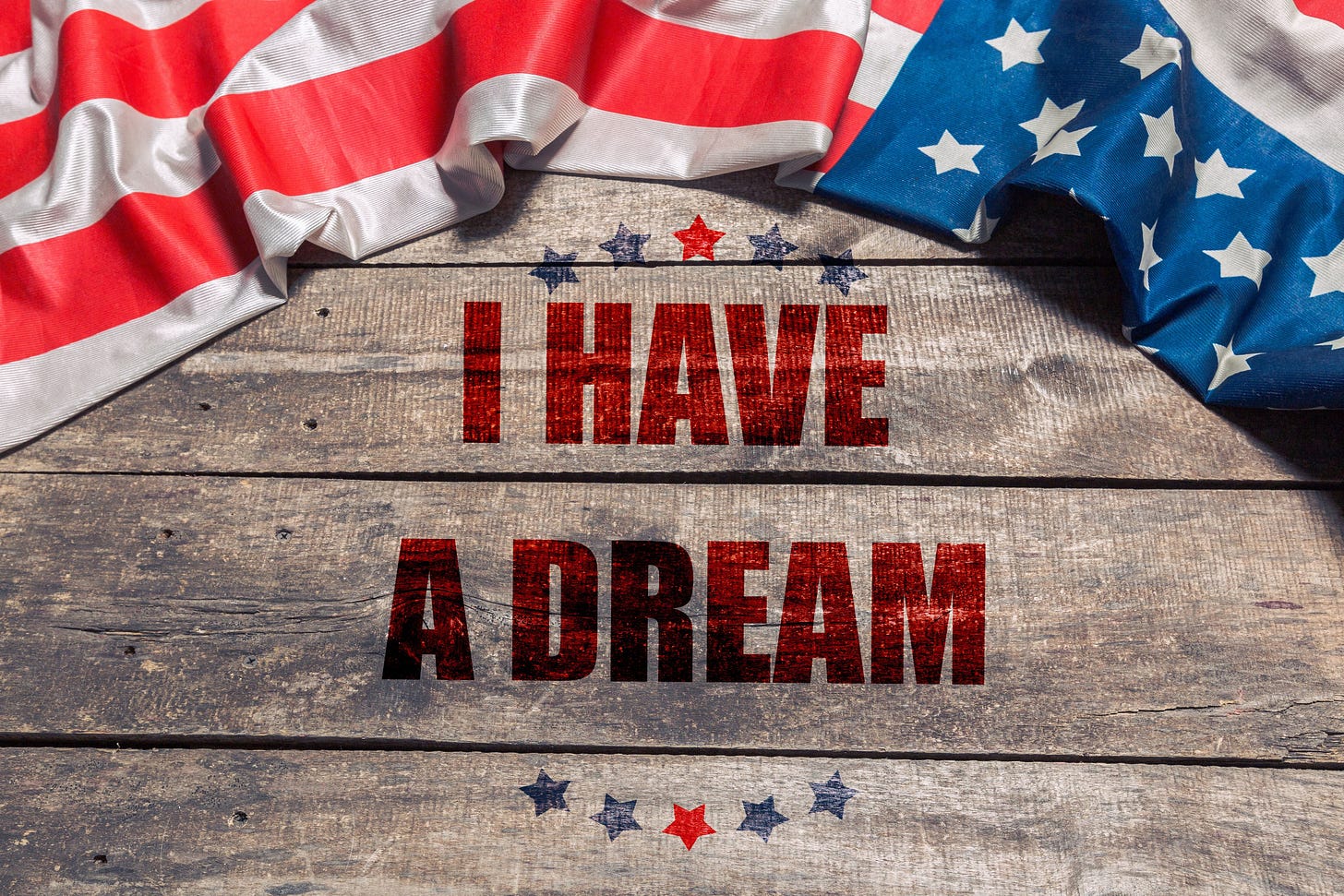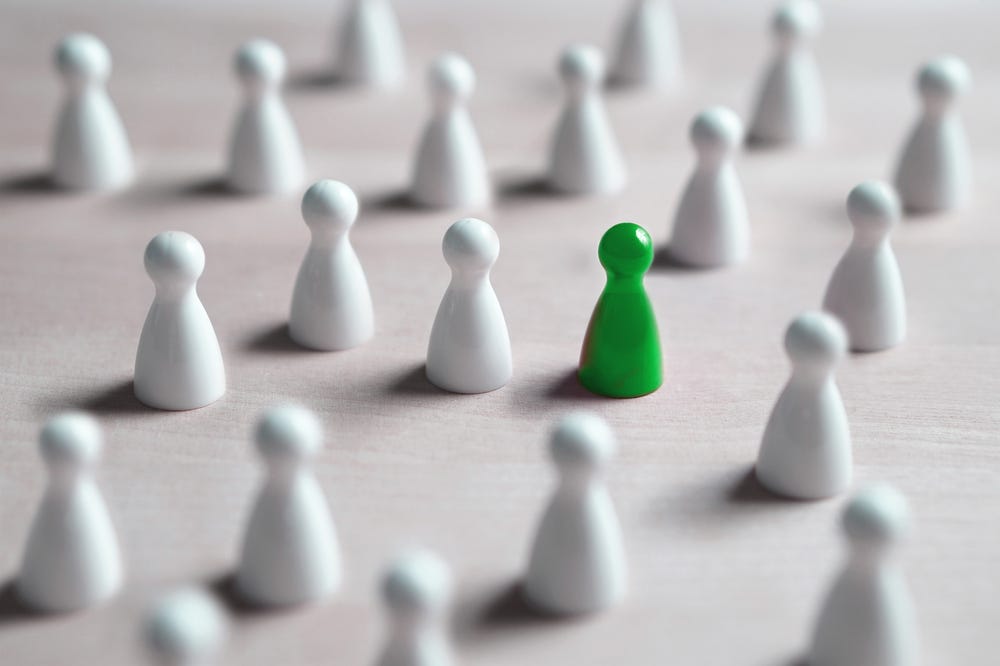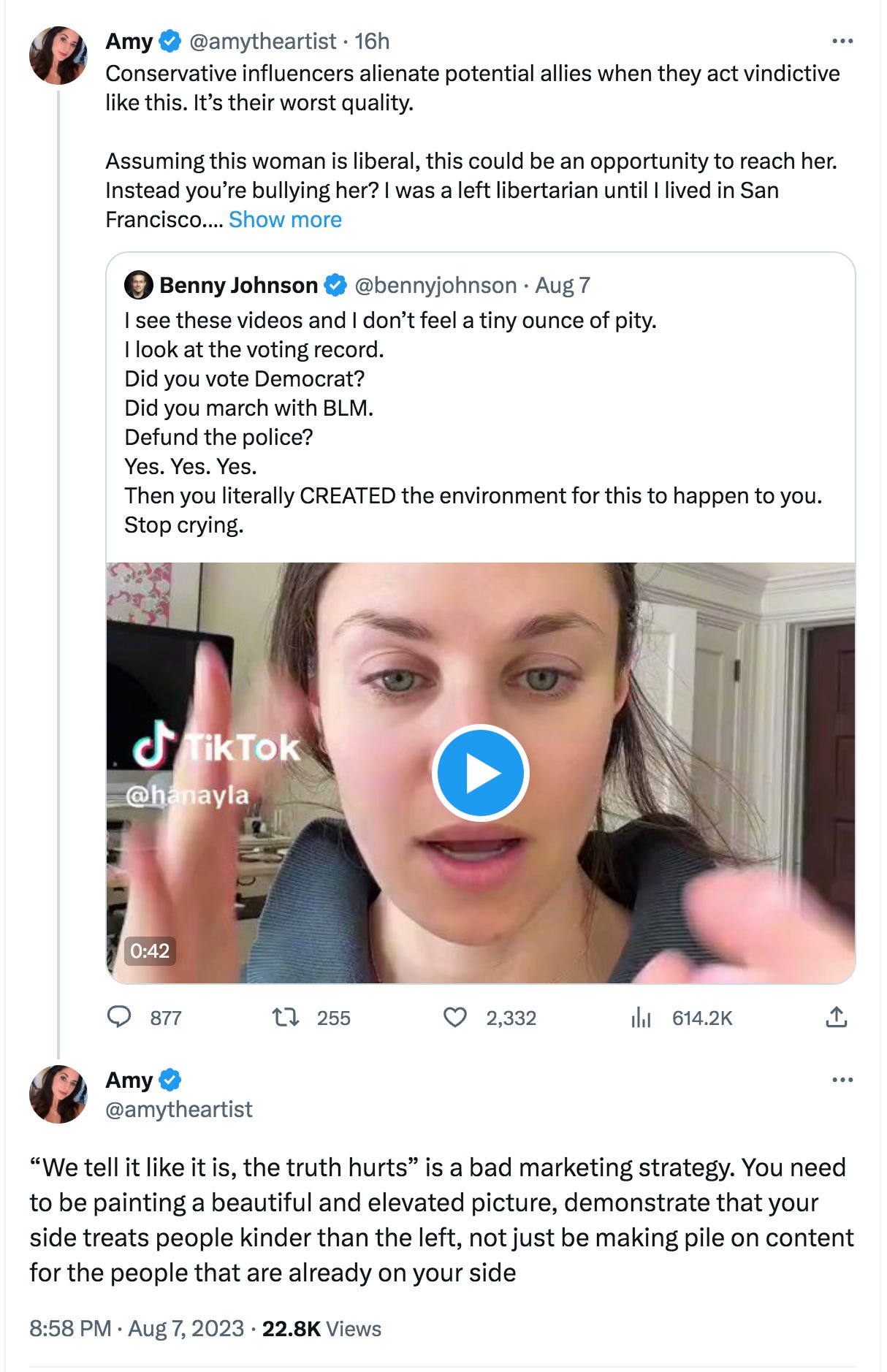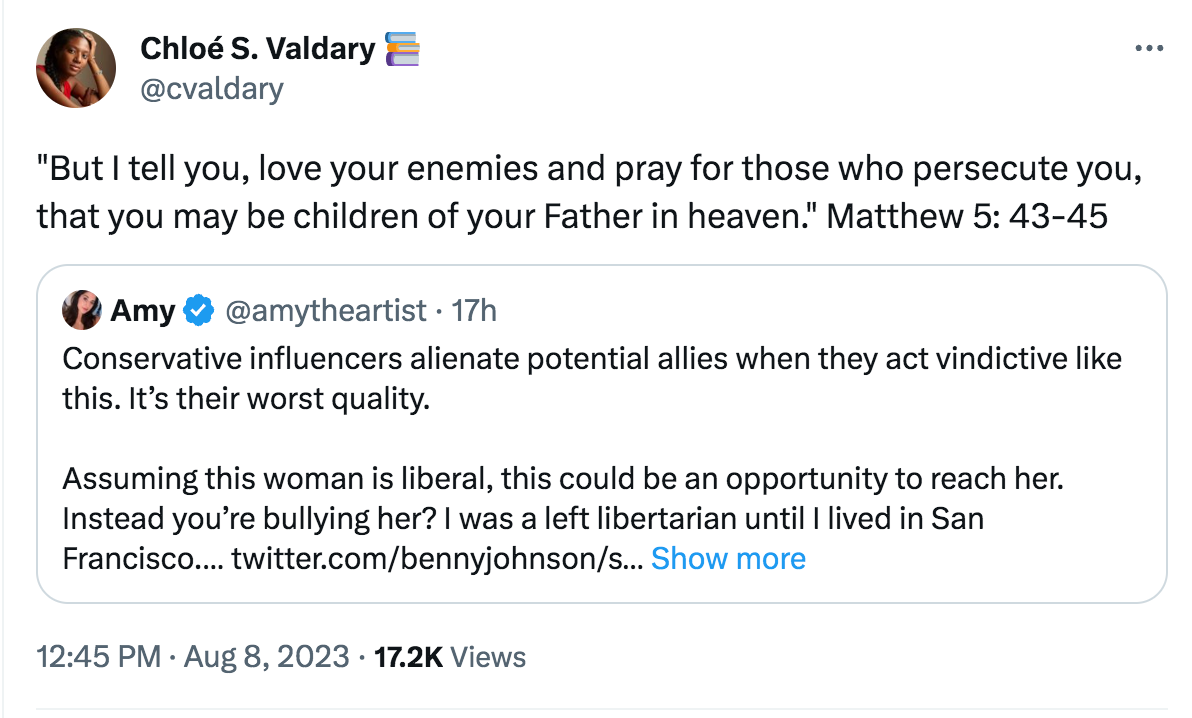E-Pluribus | August 8, 2023
Policing the language police; did Martin Luther King dream about DEI?; and has individualism gotten out of hand?
A round-up of the latest and best writing and musings on the rise of illiberalism in the public discourse:
Keith Humphreys: The Burden of Proof Is on the Language Police
“Sticks and stones may break my bones, but words will never hurt me” has always been more aspirational than factual, but Keith Humphreys at The Atlantic says just because words can hurt doesn’t mean they always do. Depending on who is telling it, cleaning up or dumbing down the English language is practically a blood sport these days, but Humphreys says it shouldn’t be as difficult as it’s made out to be.
My field—addiction and drug policy—has a tradition of savage infighting over language. Are the people whom earlier generations derided as vagrants or bums more appropriately termed homeless people, people who are homeless, unsheltered persons, persons with lived experience of being unhoused, or something else? Similar arguments erupt in politics, in journalism, in the classroom, in the workplace, and between generations at the dinner table. When even sincere, well-intended people cannot agree on which words reinforce social injustice and damage human well-being, the debates can be mutually bruising.
[ . . . ]
To ask for evidence when a term is asserted to be harmful will strike some people as mere resistance to change. In fact, quite a bit of evidence on the effects of terminology is available to guide us, and in some cases, it backs up a linguistic shift. According to one study in my field, seeing an individual described as a substance abuser rather than as having a substance-use disorder makes people more likely to view them as a safety threat and as deserving of punishment. Some terms are called harmful because that is demonstrably what they are.
But many other claims about the harmfulness or virtue of individual terms lack clear evidence, and we should therefore be humble in generalizing. The best evidence for why experts and policy makers should tolerate a broad range of terminology is the demonstrated diversity in what groups of people prefer to be called. One day, a white American colleague chastised me for using the allegedly demeaning term elder when discussing drug overdoses among Medicare participants, shortly before I got on a Zoom call in which Canadian colleagues of Indigenous ancestry repeatedly used the same term as a sign of respect for the longest-lived members of their community. During my clinical training as a psychologist, I was informed (without evidence) that patient was a destructively medicalized term for people seeking mental-health care, and that I should use only client. But surveys of real-life people seeking care show no consensus. In one study, individuals seeing a psychiatrist or a nurse, for example, preferred patients, whereas patients and clients were equally popular among those consulting a social worker or an occupational therapist. Acceptance of other terms—including service users, people who use services, and consumers—varies considerably. In short, there is no single ideal term, and the search for one founders on the reality that individuals with the same condition routinely differ about what they wish to be called.
Ironically, the impulse to promote equity through new terminology fails in some cases to take account of individual and cultural diversity. Many U.S. academics quickly adopted the neologism Latinx as a more inclusive, gender-neutral alternative to Hispanic or Latino, even though the term bemuses or annoys some people of Latin American descent and survey data suggest that few use it to describe themselves.
Read it all here.
Robert P. George: Are classrooms exchanging MLK’s dream for identity politics?
Martin Luther King had a dream, and America has spent decades now arguing over whether that dream is any closer to being realized or if it’s even possible. Writing in The Deseret News, Robert P. George examines critical race theory and identity politics and suggests the message about race delivered to students is at odds with King’s vision.
More than 40 years ago, law professor Derek Bell, along with Richard Delgado, Maria Matsuda, Patricia Williams and others, developed an approach to the study of law as it bears on matters of race that came to be known as “critical race theory.”
[ . . . ]
The basic idea was to show that racism — and inequalities produced by racism or associated with it — were obscured by conventional, formalistic legal analysis and “liberal” ideology that purported, at least, to prescind from racial or other identitarian forms of categorization.
[ . . . ]
The world is divided up into two categories or classes: persecutors and persecuted, oppressors and victims. You are one or the other depending on your “identity.” If you are a “white, heterosexual, cisgender” person, and especially if you are one of those who is also male, then you enjoy “privilege” that makes you, wittingly or unwittingly, at least something of an oppressor — or, at a minimum, a beneficiary of oppression. If you are BIPOC (Black, indigenous, person of color) or LGBTQA+, then you are in the victim class. Everything is racialized or (more broadly) “identitized.”
In this way, students are taught to think of themselves as privileged or victimized. The privileged are infected by “whiteness,” which it is their duty to recognize in themselves and in society and to ameliorate. They must adopt — and express (for “silence is violence”) —certain moral and political views. They must confess that they have wrongly benefited from “white privilege” and they must adjust their behavior accordingly. They must be an “ally” and, while not leading (for that would be taking advantage of their privilege), they must support “diversity, equity and inclusion.”
Supporting “equity” means rejecting merely formal equality, that is, treating people the same — equally — irrespective of race or ethnicity — which allegedly masks privilege and the racism and other forms of bigotry (e.g., “heteronormativity”) that created and sustains it. Demographic performance disparities arising in contexts of formal equality must be seen as the fruit of prejudice and injustice and, in the name of “equity,” not be allowed to stand. Concepts like “merit” must be abandoned — again, they allegedly mask privilege.
Read it all.
Michael Bonner: The Problem of Hyper-Individualism
Americans have always valued individualism, but is there such a thing as too much of a good thing? Writing at City Journal, Michael Bonner argues that this American penchant for self-reliance combined with technology and the structure of our modern society could be taking us down a path that will undermine our ability to function as a free and prosperous pluralistic society.
These are all alarming statistics, but they are part of a longer-running trend. A kind of loneliness grew over the course of the twentieth century in the West, worsening toward its end. Robert Putnam’s famous book Bowling Alone showed that participation in clubs or civic societies had declined over the course of the last century. The number of men with no close friends has increased fivefold since 1990. Suicides have increased in the United States since the end of the twentieth century, as have deaths of despair. In 2016, Europe was found to be the most suicidal region in the world by gross rate. Average life expectancy in America has begun to decline. According to a recent Gallup survey, only 31 percent of respondents said that they had attended a church, synagogue, mosque, or temple within the past seven days. This represents a noteworthy decline of about 10 percent from the late-twentieth century up to about 2012.
Young people, too, are increasingly unhappy. The percentage of teenaged Americans who claim not to enjoy life, or who believe that their lives are not useful, is now just under 50 percent—nearly a 20 percent rise since the early 1990s, as documented in Jean M. Twenge’s new book Generations. Hopelessness, despondency, and a sort of “flatness” have been invoked to describe the dominant feeling of our time. Politics is polarized practically everywhere. Warfare has returned to Europe, and a deteriorating Russia is once again threatening to use nuclear weapons.
[ . . . ]
Two hundred years ago, Tocqueville detected the demon of “hyper-individualism” lurking within American egalitarianism. Its influence has waxed and waned over time, but no one has yet driven it out. In an aristocratic society, families would remain in the same position and very often in the same place. An individual man would always have reason to be mindful of his ancestors and descendants; and he would readily sacrifice personal pleasure for the sake of others, whether his present neighbors or those who had gone before or who were yet to be born. But the freedom promised by democracy was bound to degrade social ties and leave people personally, politically, and socially isolated. In an egalitarian society, it would be possible to gain enough wealth to look after one’s own needs, so as to owe nothing to anybody and to require nothing from others. People in such circumstances would come to feel themselves isolated and yet also capable of moulding their destinies as they wished. Each man would find himself, as Tocqueville predicted, “shut up entirely within the solitude of his own heart,” indifferent to the fate of others.
Read the whole thing.
Around Twitter
Some brief thoughts on the “Cry more, lib” school of thinking on engaging non-conservatives prompted by Benny Johnson’s response to a (presumably) liberal woman on TikTok complaining about crime and fear in San Francisco:
The latest from ProPublica on a link between shootings and social media has implications for censorship and artistic expression:
And finally, this candidate for prime minister in Canada struggles valiantly to avoid a simple yes or no:










